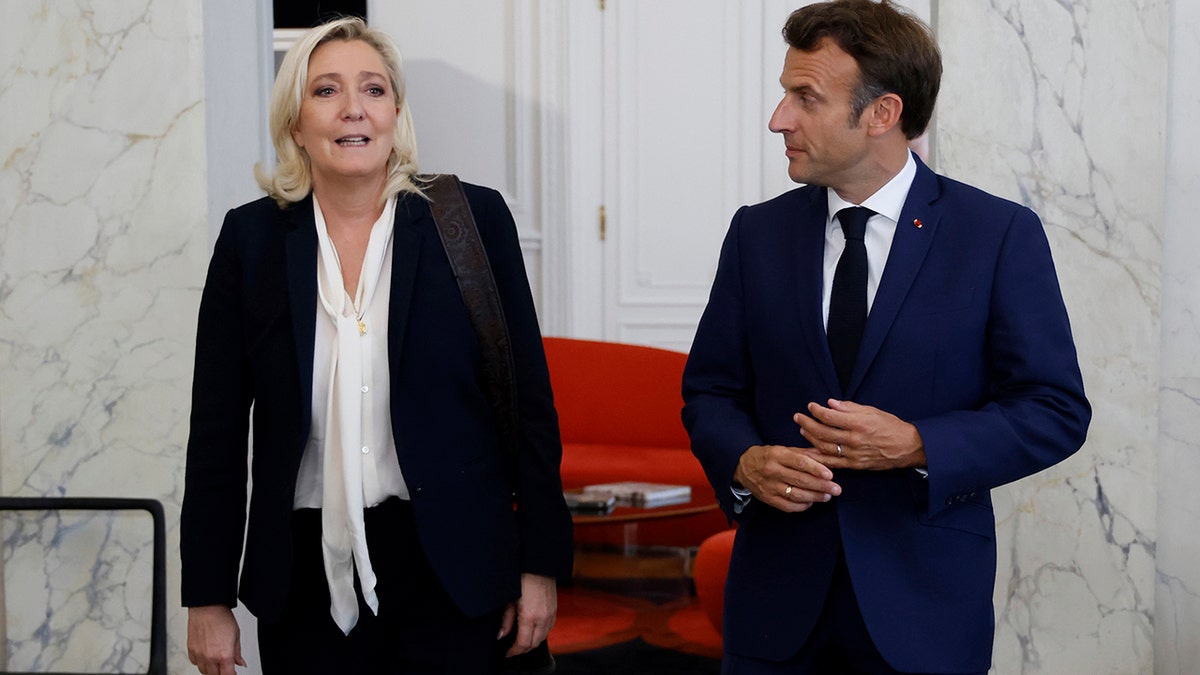Jordan Bardella could become France's next prime minister
The 28-year-old right-wing populist, Bardella shocked the establishment when his party got 31.5% of the vote in the recent EU election. (Video: Reuters)
Rivals of France’s right-wing National Rally party are scrambling Monday to prevent it from obtaining an absolute majority after it made considerable gains in the country’s first round of elections, potentially paving the way for France's most conservative government since World War II.
Marked by high turnout of nearly 68%, voters handed Marine Le Pen’s National Rally party a strong lead on Sunday, with about 33% of the vote. The New Popular Front, a leftist alliance, finished second with about 28%. President Emmanuel Macron’s centrist group came third with around 20%, according to figures released by the Interior Ministry.
"The French have almost wiped out the ‘Macronist’ bloc," Le Pen said Sunday night following the first round of results, which she added showed voters’ "willingness to turn the page after 7 years of contemptuous and corrosive power."
The left-wing coalition now says it will withdraw its candidates in districts where they finished third in order to support other candidates opposed to the right. Macron's centrist alliance also said some of its candidates would step down before the July 7’s decisive runoff elections to try to block the National Rally party.

French right-wing leader Marine Le Pen, right, casts her ballot for the first round of the parliamentary election on Sunday, June 30, 2024 in Henin-Beaumont, northern France. Thibault Camus) (AP/Thibault Camus)
In Sunday's voting, 78 of the National Assembly's 577 seats were won outright, by candidates who got more than 50% of the vote in their district, according to French newspaper Liberation's analysis of the Interior Ministry data. Of those, 38 were from the National Rally, including Le Pen herself.
Polling projections suggest the National Rally will have the most seats in the next National Assembly – which is the more powerful of France’s two houses of parliament – but it is unclear whether it will get an absolute majority of 289 of the 577 seats, according to the Associated Press.
The elections come as many French voters are struggling with inflation and low incomes and a sense that they are being left behind by globalization, the AP reported.
Le Pen’s party, which blames immigration for many of France's problems, has tapped into that voter frustration and built a nationwide support network, notably in small towns and farming communities that see Macron and the Paris political class as out of touch.
RIVALS BLAST MACRON FOR FEARMONGERING AFTER FRENCH PRESIDENT WARNS ‘CIVIL WAR’ ON HORIZON

Supporters of French right-wing leader Marine Le Pen react after the release of projections based on the actual vote count in select constituencies , on Sunday, June 30, 2024 in Henin-Beaumont, northern France. (AP/Thibault Camus)
If the National Rally or another political force other than his centrist alliance gets a majority, Macron will be forced to appoint a prime minister belonging to that new majority.
In such a situation – called "cohabitation" in France – the government would implement policies that diverge from the president’s plan.
Earlier this month, Macron dissolved parliament and called for a surprise vote after the National Rally clobbered his party in the European Parliament election. The move was seen as a risky gamble that French voters, complacent about the European election, would be motivated to back moderate forces to keep the National Rally out of power.
Le Pen called on voters to give the National Rally an "absolute majority" in parliament. She said a National Rally majority would enable the right to form a new government with party President Jordan Bardella as prime minister to work on France's "recovery."

French President Emmanuel Macron, right, meets French right-wing National Rally leader Marine Le Pen at the Elysee Palace on June 21, 2022, in Paris. (Ludovic Marin/Pool/AP)
CLICK HERE TO GET THE FOX NEWS APP
While Macron has said he will not step down before his presidential term expires in 2027, cohabitation would weaken him at home and on the world stage.
Fox News’ Bradford Betz and the Associated Press contributed to this report.


